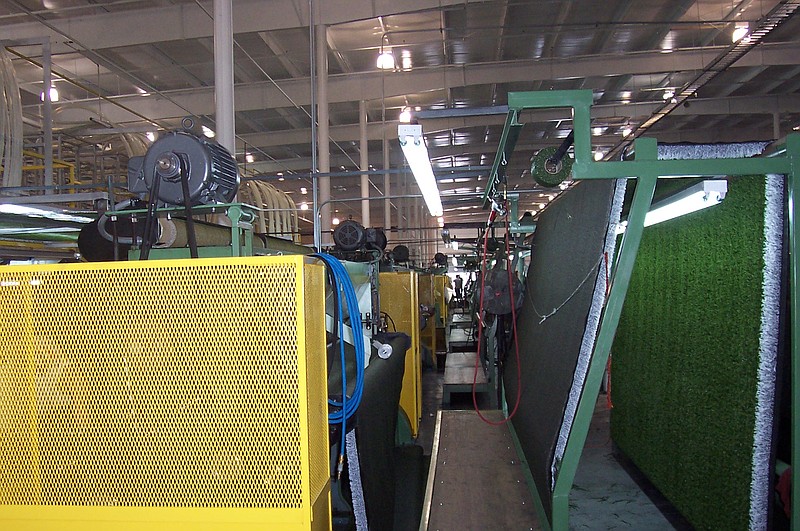Artificial turf fields manufactured in Calhoun, Ga., are at the heart of three lawsuits currently in a federal court in California, as three West Coast school systems seek millions of dollars in damages from FieldTurf USA Inc.
The suits claim fields made and sold by FieldTurf failed to reach their guaranteed life expectancy, and that FieldTurf has failed to honor warranties and replace the fields.
FieldTurf manufactures artificial turf playing surfaces at its 500,000-square-foot facility in Calhoun, which employs more than 40 people.
According to court documents, two public school districts in California - Chaffey Joint Union High School and Bret Harte Union High School - and one private school, Crystal Springs Upland School, all purchased artificial turf playing surfaces from FieldTurf around 2008 and 2009, and had the new playing surfaces installed in 2009.
In each case, school officials claim in court documents they were promised the new fields would last eight to 10 years, and were issued eight-year manufacturer's warranties. The school systems say they were told they would be able to amortize, or gradually offset, the cost of new artificial fields over a 10-year span.
But each of the three school systems say before the end of eight years, the fields they bought from FieldTurf started failing.
The school systems allege the FieldTurf surfaces started failing as early as 2014, when "breaking, splitting and thinning of the individual fibers characterized by fibrillation, fiber breakage and pile layover" began happening, and that FieldTurf has refused to replace the fields with newer surfaces.
The school districts also allege FieldTurf knew the artificial surfaces it sold them were faulty, because FieldTurf in 2011 filed suit against its fiber supplier, Ten Cate, which is owned by the multinational group Royal Ten Cate, for providing faulty fibers. That suit was settled in 2014.
"It's about breach of contract," said Irina Mazor, one of the California lawyers representing the school systems. "Here's what I promised to give you, as opposed to what you actually received, and it's a matter of fraud."
The school systems are seeking a combined $15.7 million in damages.
FieldTurf officials could not be reached for comment on the complaints.
The California school districts' complaints are still recent, but the lone response from FieldTurf in court so far alleges the school district's negligent misrepresentation and False Claims Act complaints aren't valid because of the nature of the field transactions.
FieldTurf claims the economic loss rule prevents the Chaffey school district from collecting damages, since the district "failed to allege resulting personal injury or damage to property other than the product itself."
FieldTurf also alleges the school district fails to live up to the standing required to seek damages under a False Claims Act complaint, citing an ongoing lawsuit between the Los Angeles Memorial Coliseum Commission and music event organizer Insomniac.
In early March, FieldTurf motioned to have the Chaffey school district's complaint partially dismissed.
Contact staff writer Alex Green at agreen@timesfreepress.com or 423-757-6480.
